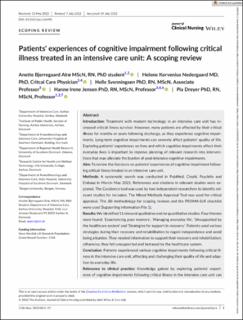| dc.contributor.author | Alrø, Anette Bjerregaard | |
| dc.contributor.author | Nedergaard, Helene Korvenius | |
| dc.contributor.author | Svenningsen, Helle | |
| dc.contributor.author | Jensen, Hanne Irene | |
| dc.contributor.author | Dreyer, Pia | |
| dc.date.accessioned | 2023-04-18T11:34:55Z | |
| dc.date.available | 2023-04-18T11:34:55Z | |
| dc.date.created | 2022-11-07T10:16:07Z | |
| dc.date.issued | 2022 | |
| dc.identifier.issn | 0962-1067 | |
| dc.identifier.uri | https://hdl.handle.net/11250/3063557 | |
| dc.description.abstract | Introduction
Treatment with modern technology in an intensive care unit has increased critical illness survival. However, many patients are affected by their critical illness for months or years following discharge, as they experience cognitive impairments. Long-term cognitive impairments can severely affect patients' quality of life. Exploring patients' experiences on how and which cognitive impairments affect their everyday lives is important to improve planning of relevant research into interventions that may alleviate the burden of post-intensive cognitive impairments.
Aim
To review the literature on patients' experiences of cognitive impairment following critical illness treated in an intensive care unit.
Methods
A systematic search was conducted in PubMed, Cinahl, PsycInfo and Embase in March–May 2021. References and citations in relevant studies were explored. The Covidence tool was used by two independent researchers to identify relevant studies for inclusion. The Mixed Methods Appraisal Tool was used for critical appraisal. The JBI methodology for scoping reviews and the PRISMA-ScR checklist were used (Supporting Information File 1).
Results
We identified 11 relevant qualitative and/or quantitative studies. Four themes were found: ‘Experiencing poor memory’, ‘Managing everyday life’, ‘Unsupported by the healthcare system’ and ‘Strategies for support in recovery’. Patients used various strategies during their recovery and rehabilitation to regain independence and avoid being a burden. They needed information to support their recovery and rehabilitation; otherwise, they felt unsupported and betrayed by the healthcare system.
Conclusion
Patients experienced various cognitive impairments following critical illness in the intensive care unit, affecting and challenging their quality of life and adaption to everyday life. | en_US |
| dc.language.iso | eng | en_US |
| dc.publisher | Wiley | en_US |
| dc.rights | Navngivelse 4.0 Internasjonal | * |
| dc.rights.uri | http://creativecommons.org/licenses/by/4.0/deed.no | * |
| dc.title | Patients' experiences of cognitive impairment following critical illness treated in an intensive care unit: A scoping review | en_US |
| dc.type | Journal article | en_US |
| dc.type | Peer reviewed | en_US |
| dc.description.version | publishedVersion | en_US |
| dc.rights.holder | Copyright 2022 The Author(s) | en_US |
| cristin.ispublished | true | |
| cristin.fulltext | original | |
| cristin.qualitycode | 2 | |
| dc.identifier.doi | 10.1111/jocn.16490 | |
| dc.identifier.cristin | 2069793 | |
| dc.source.journal | Journal of Clinical Nursing (JCN) | en_US |
| dc.identifier.citation | Journal of Clinical Nursing (JCN). 2022. | en_US |

